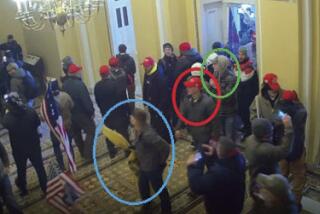Marine Is Found Safe in Lebanon
BEIRUT — A Marine corporal missing from his unit in Iraq for more than two weeks was safely with American officials here, but his appearance at the U.S. Embassy compound Thursday did little to dispel the mystery surrounding a bizarre disappearance.
Cpl. Wassef Ali Hassoun, who has been variously listed as absent without authorization, captured and held hostage under threat of beheading, met with American officials and was taken to the embassy, U.S. officials said.
Hassoun’s relatives in Utah said that they had spoken with the Marine and that he was being transferred to a U.S. military base in Germany.
Pentagon officials said Hassoun was not under detention, but they confirmed that the Naval Criminal Investigative Service was conducting what an official described as a noncriminal inquiry.
“The investigation is ongoing, and we don’t know how he got there or what went on between the time that he was reported missing from his unit until he got into Lebanon,” Army Brig. Gen. David Rodriguez said at the Pentagon.
A defense official in Washington said Hassoun called the defense attache at the U.S. Embassy in Beirut and asked to meet him at a coffee shop. But when the attache showed up, Hassoun was not there. Hassoun called again, and was picked up three hours later at the shop and taken to the embassy, arriving there about 6 p.m.
U.S. officials could offer no new details on how Hassoun spent the 18 days after he disappeared from his unit near Fallouja and until he reappeared 500 miles away in the neighborhood in the Lebanese town of Tripoli where many of his relatives live. That neighborhood was hit Thursday by gunfire that left two people dead. There was speculation that the violence may have been a result of anger over Hassoun’s service with U.S. forces.
Though military officials shed no new light on Hassoun’s disappearance, several Marines in Iraq said Hassoun was distraught after witnessing the death of a gunner who was hit at point-blank range with a rocket-propelled grenade or another large round that blasted the gunner’s body.
“Seeing something like that would upset anyone,” said one Marine based near Fallouja. Hassoun was posted near the city when he became what the Marines described as absent without leave.
Defense officials in Washington avoided saying Thursday that Hassoun had deserted his unit. They refused to comment on speculation that his capture and threatened slaying had been a hoax. They also declined to comment on reports that Hassoun was being transferred to a military base in Germany for questioning.
However, one White House official involved in counter-terrorism, asked whether Hassoun was a deserter, said that “not interested in serving is a better way to put it.”
If an investigation found that Hassoun had improperly left the 1st Marine Expeditionary Force, in which he served as an interpreter, he could be charged with desertion, a military offense that carries the maximum punishment of the death penalty, although no U.S. service member has been executed for desertion since World War II.
A Florida National Guardsman -- a self-described conscientious objector-- accused of desertion in a high-profile case was court-martialed and sentenced May 21 to a year in prison and given a bad-conduct discharge, a step that denies him benefits.
Hassoun’s disappearance has been shadowed by contradictory accounts of his fate. He was photographed appearing to be a hostage, blindfolded and threatened with execution. Islamist websites reported last weekend that he had been beheaded, but that account was disputed the next day by another website. A little-known band of Iraqi militants released a statement the next day claiming they were holding Hassoun hostage. If he was a hostage, no explanation has been offered on how he escaped his captors.
Some reports said that he was lured away from his base by an Arab woman and kidnapped. Others reported that he had tired of the fighting, abandoned his post and headed for Lebanon.
By midweek, family members in Utah and Lebanon began to tell reporters that they had been given an irrefutable sign that Hassoun was free and healthy, but they refused to say how they knew.
He evidently became an issue in the predominantly Sunni Muslim city of Tripoli, where his relatives live on a working-class street of densely packed apartment blocks. At least two people were killed and one wounded when clashes erupted there. Gunfights broke out between members of Hassoun’s clan and neighbors, who apparently were enraged over his participation in the U.S.-led occupation of Iraq.
Clan divisions run deep in Tripoli, Lebanon’s second-largest city, and the feud between the two clans started long before Hassoun became an international news story, according to local accounts.
Still, the Marine’s family appeared rattled, using cars to barricade their street before locking themselves in their homes. Reached by phone in Tripoli, Hassoun’s brother Sami said family members feared for their safety and hoped to reach the embassy before Hassoun was flown out of the country.
Embassy spokeswoman Elizabeth Wharton said Hassoun’s family brought the Marine to Beirut, where he was picked up by U.S. officials at the arranged location.
A source close to the Lebanese government said Hassoun’s brother had phoned him Wednesday night to complain that officials at the U.S. Embassy weren’t allowing the family to see the Marine.
The embassy “may have been trying to protect him from local wrath, now that it’s known that he’s an active member of the U.S. military,” the government source said. “It’s not easy to say here that you’re an active member of the forces occupying Iraq.”
U.S. officials denied that he had been isolated from his family. “He arrived here today, accompanied by family members, and prior to that he was not at the embassy for one moment,” Wharton said. “He is not being prevented from communicating with his family. He is not here as a prisoner. He is here voluntarily.”
In West Jordan, Utah, Hassoun’s brother Mohammed and Tarek Nosseir, a local religious leader, emerged from the family home to talk to reporters.
Mohammed Hassoun said he thanked God that the family’s prayers had been answered and that his brother was safe. He also thanked the Marines and local leaders for their support. He said he had spoken to his brother and that he was in good spirits and would be going to Germany.
Nosseir, who has acted as the family spokesman, did not delve into the circumstances involving the Marine’s disappearance from his unit in Iraq.
“We also want to know what happened,” Nosseir said. “But that will be up to the Marines. We pray this is the final chapter in this story.”
Times staff writers Patrick J. McDonnell in Baghdad, David Kelly in Denver and Mark Mazzetti and Paul Richter in Washington contributed to this report.
*
(BEGIN TEXT OF INFOBOX)
Missing Marine safe in Lebanon
U.S. officials are investigating the circumstances involving the disappearance of Marine Cpl. Wassef Ali Hassoun.
June 19, 2004 Hassoun disappears; U.S. military subsequently lists him as on “unauthorized leave” June 27 Al Jazeera airs video of Hassoun blindfolded; “Islamic Response” claims responsibility; U.S. military subsequently lists him as “captured” July 3 Two Islamic websites claim Hassoun has been beheaded July 4 Another website declares he’s not dead July 5 Iraqi militant group says it’s holding Hassoun, still alive July 6 Hassoun’s family says they had word that he’d been released July 7 Lebanese official says Hassoun was released after pledging not to return to the military July 8 Hassoun arrives at the U.S. Embassy in Beirut
Source: Associated Press
More to Read
Sign up for Essential California
The most important California stories and recommendations in your inbox every morning.
You may occasionally receive promotional content from the Los Angeles Times.










